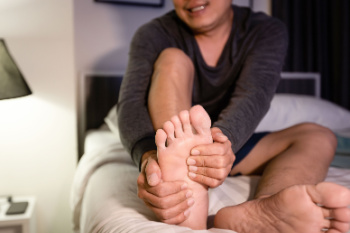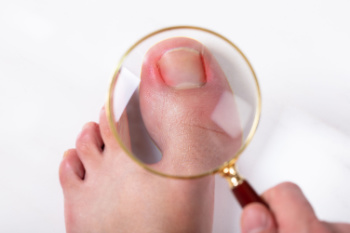
Drexel Hill (484) 521-0233
West Chester (610) 436-5883

Drexel Hill (484) 521-0233
West Chester (610) 436-5883

A Lisfranc fracture is an injury to the midfoot, where the metatarsal bones connect to the tarsal bones. This type of fracture can occur from a fall, a twist of the foot, or direct trauma, such as dropping something heavy on the foot, or a sports-related impact. Symptoms often include swelling, bruising on the top or bottom of the foot, pain while standing or walking, and an inability to bear weight. It may feel like a sprain at first, but without proper treatment, it can lead to long-term complications, like chronic pain or arthritis. A podiatrist can diagnose a Lisfranc fracture through a physical exam and imaging tests like X-rays or MRI scans. Treatment depends on the severity and may include immobilization with a cast or boot, or surgery to realign and stabilize the bones with screws or plates. Early diagnosis and care are essential for a full recovery. If you have this type of foot pain, it is suggested that you schedule an appointment to see a podiatrist for a diagnosis and appropriate treatment.
A broken foot requires immediate medical attention and treatment. If you need your feet checked, contact the podiatrists from Dr. Siegerman & Associates. Our doctors can provide the care you need to keep you pain-free and on your feet.
Broken Foot Causes, Symptoms, and Treatment
A broken foot is caused by one of the bones in the foot typically breaking when bended, crushed, or stretched beyond its natural capabilities. Usually the location of the fracture indicates how the break occurred, whether it was through an object, fall, or any other type of injury.
Common Symptoms of Broken Feet:
Those that suspect they have a broken foot shoot seek urgent medical attention where a medical professional could diagnose the severity.
Treatment for broken bones varies depending on the cause, severity and location. Some will require the use of splints, casts or crutches while others could even involve surgery to repair the broken bones. Personal care includes the use of ice and keeping the foot stabilized and elevated.
If you have any questions please feel free to contact one of our offices located in Drexel Hill and West Chester, PA . We offer the newest diagnostic and treatment technologies for all your foot and ankle needs.

Plantar fasciitis is a common cause of heel pain, especially in active adults or those who are on their feet for long periods. It develops when the thick band of tissue along the bottom of the foot becomes inflamed. Treatment often begins with rest and stretching exercises to reduce strain on the fascia. Supportive footwear and custom orthotics can help redistribute pressure and prevent further injury. In some cases, night splints or anti-inflammatory medications may help. More persistent cases might benefit from shockwave therapy or corticosteroid injections. Surgery is rarely needed but is available for severe, long-standing pain that does not improve. Early care makes a significant difference in recovery time and overall outcome. If you have ongoing heel pain that may be plantar fasciitis, it is suggested you see a podiatrist for a diagnosis and appropriate treatment.
Plantar fasciitis can be very painful and inconvenient. If you are experiencing heel pain or symptoms of plantar fasciitis, contact the podiatrists from Dr. Siegerman & Associates. Our doctors can provide the care you need to keep you pain-free and on your feet.
What Is Plantar Fasciitis?
Plantar fasciitis is the inflammation of the thick band of tissue that runs along the bottom of your foot, known as the plantar fascia, and causes mild to severe heel pain.
What Causes Plantar Fasciitis?
How Can It Be Treated?
While very treatable, plantar fasciitis is definitely not something that should be ignored. Especially in severe cases, speaking to your doctor right away is highly recommended to avoid complications and severe heel pain. Your podiatrist can work with you to provide the appropriate treatment options tailored to your condition.
If you have any questions please feel free to contact one of our offices located in Drexel Hill and West Chester, PA . We offer the newest diagnostic and treatment technologies for all your foot and ankle needs.

Ingrown toenails develop when the edges or corners of a toenail grow into the surrounding skin, causing pain, redness, and swelling. The condition can happen on either the side, tip or even the base of the toenail. Common causes include improper nail trimming, tight shoes, or injury to the toe. In some cases, genetics or fungal infections can contribute to the development of ingrown toenails. Symptoms include localized pain, swelling, and sometimes pus or drainage if an infection sets in. The affected toe may appear red or tender, and pressure from shoes can increase the pain. Left untreated, ingrown toenails can lead to more serious complications, such as infection or permanent nail damage. A podiatrist can provide effective treatments for ingrown toenails, including trimming or removing the nail, draining any infection, and prescribing antibiotics if necessary. In chronic cases, they may perform a minor procedure to prevent the nail from growing back incorrectly. If you are dealing with an ingrown toenail, it is suggested that you make an appointment with a podiatrist for care.
Ingrown toenails can become painful if they are not treated properly. For more information about ingrown toenails, contact the podiatrists of Dr. Siegerman & Associates. Our doctors can provide the care you need to keep you pain-free and on your feet.
Ingrown Toenails
Ingrown toenails occur when a toenail grows sideways into the bed of the nail, causing pain, swelling, and possibly infection.
Causes
Prevention
Because ingrown toenails are not something found outside of shoe-wearing cultures, going barefoot as often as possible will decrease the likeliness of developing ingrown toenails. Wearing proper fitting shoes and using proper cutting techniques will also help decrease your risk of developing ingrown toenails.
Treatment
Ingrown toenails are a very treatable foot condition. In minor cases, soaking the affected area in salt or antibacterial soaps will not only help with the ingrown nail itself, but also help prevent any infections from occurring. In more severe cases, surgery is an option. In either case, speaking to your podiatrist about this condition will help you get a better understanding of specific treatment options that are right for you.
If you have any questions please feel free to contact one of our offices located in Drexel Hill and West Chester, PA . We offer the newest diagnostic and treatment technologies for all your foot and ankle needs.

Poor circulation in the feet can lead to discomfort and may signal underlying health concerns. Common symptoms include cold feet, tingling, numbness, cramping, or a heavy sensation, especially during walking or rest. The skin may appear pale or bluish, and wounds may heal slowly. These signs often result from reduced blood flow, which limits oxygen and nutrient delivery to the tissues. Causes include peripheral artery disease, where narrowed blood vessels restrict circulation, and diabetes, which can damage blood vessels over time. Other contributing factors are smoking, obesity, and a sedentary lifestyle. Poor circulation can also stem from blood clots or nerve conditions. If you have any of the above symptoms, it is strongly suggested that you visit a podiatrist who can help you to manage this condition.
Poor circulation is a serious condition and needs immediate medical attention. If you have any concerns with poor circulation in your feet contact the podiatrists of Dr. Siegerman & Associates. Our doctors will treat your foot and ankle needs.
Poor Circulation in the Feet
Poor blood circulation in the feet and legs is can be caused by peripheral artery disease (PAD), which is the result of a buildup of plaque in the arteries.
Plaque buildup or atherosclerosis results from excess calcium and cholesterol in the bloodstream. This can restrict the amount of blood which can flow through the arteries. Poor blood circulation in the feet and legs are sometimes caused by inflammation in the blood vessels, known as vasculitis.
Causes
Lack of oxygen and oxygen from poor blood circulation restricts muscle growth and development. It can also cause:
Those who have diabetes or smoke are at greatest risk for poor circulation, as are those who are over 50. If you have poor circulation in the feet and legs it may be caused by PAD and is important to make changes to your lifestyle in order to reduce risk of getting a heart attack or stroke. Exercise and maintaining a healthy lifestyle will dramatically improve conditions.
As always, see a podiatrist as he or she will assist in finding a regimen that suits you. A podiatrist can also prescribe you any needed medication.
If you have any questions please feel free to contact one of our offices located in Drexel Hill and West Chester, PA . We offer the newest diagnostic and treatment technologies for all your foot and ankle needs.
Request a free copy of
Laser Away Foot Pain!
today.
